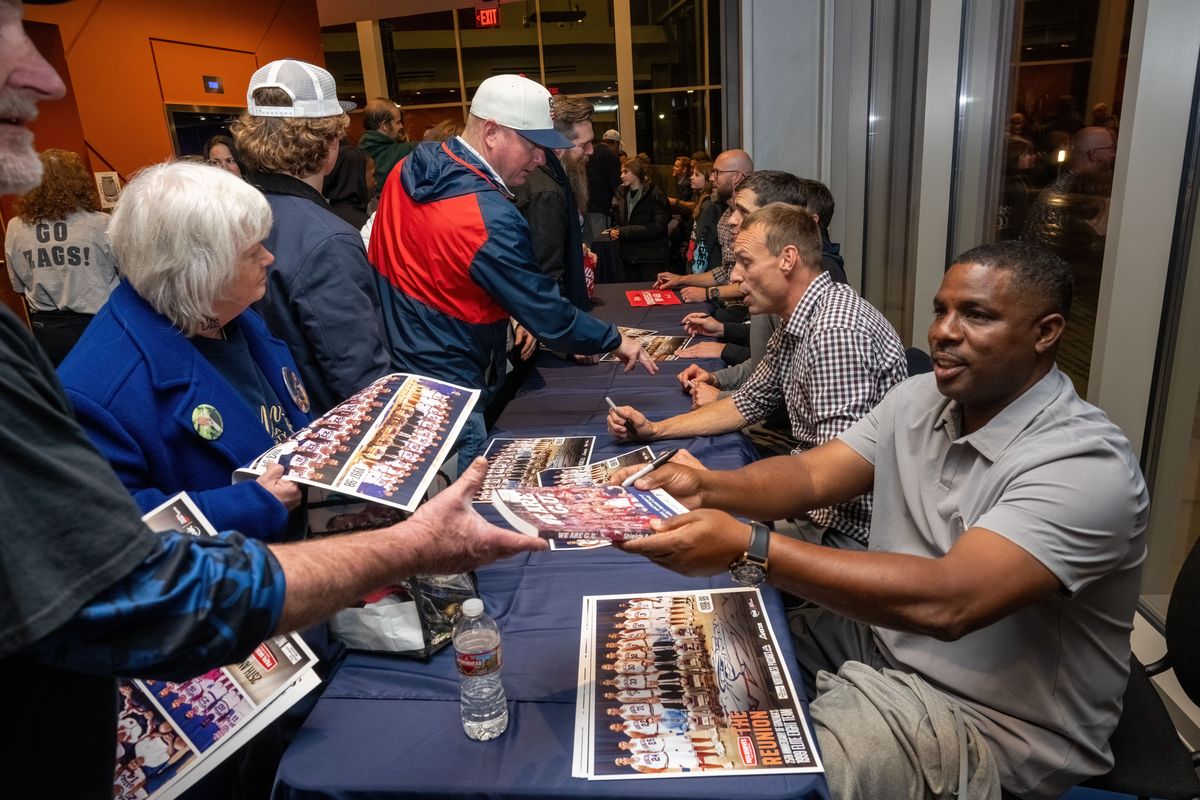‘It’s beautiful to be back’: Members of Gonzaga’s 1999 team reminisce on run to Elite Eight at Northwest Passages event

With the stage set up as a makeshift Jack and Dan’s, it was only right that the event to honor the 1999 Gonzaga men’s basketball team became two hours of recalling stories, telling jokes and reminiscing on the many moments that defined the group’s remarkable run.
Players, coaches, trainers, fans, friends and family all gathered at the Myrtle Woldson Performing Arts Center on Friday night to recognize the 25th anniversary of the Gonzaga basketball team that surprised the college basketball world and stormed into the Elite Eight – the program’s first.
The event was put on by The Spokesman-Review’s Northwest Passages and hosted by Eric Edelstein, an actor and comedian who attended Gonzaga during the run and served as the team’s play-by-play announcer.
For the players, the evening was an opportunity to reunite with old teammates, coaches, mentors and friends and reflect on the magical run and their time as a Bulldog. For Gonzaga fans, it was a chance to relive the magical shots, plays and memories that characterized the team’s success.
“That team changed the trajectory of Gonzaga basketball forever,” Bill Grier, an assistant coach for the team who coaches for Colorado, said in a prerecorded interview for the event,
The 1999 Gonzaga squad, just four years removed from the program’s first NCAA Tournament appearance, made a run of dramatic upsets, defeating seventh-seeded Minnesota, second-seeded Stanford and sixth-seeded Florida before narrowly falling to top-seeded and eventual champion Connecticut in the Elite Eight.
The tight-knit team featured many household Bulldogs names, including Richie Frahm, Matt Santangelo, Quentin Hall, Casey Calvary and former head coach Dan Monson, among others.
“We were confident and I think that’s the one thing that this team had,” big man Mike Leasure said. “I mean, we weren’t the most talented team, but we had two things – we were confident and you weren’t going to play harder than us.”
Calvary, who tipped in the shot to beat Florida and advance the team to the Elite Eight, challenged Leasure’s characterization and gave a glimpse into his competitive edge.
“Our team was super talented. I was super disappointed that we didn’t win the national title that year … I thought we underachieved big time,” said Calvary, who was met with laughter from the team and audience.
While some of the players have remained in Spokane, a few traveled from other states and countries to participate in the event, including Quentin Hall from The Bahamas and Axel Dench from Australia.
“It’s beautiful to be back,” Hall said. “I’m happy to see everybody. I’m happy to be back with these guys. It’s just a wonderful time and (we have) memories that will last forever.”
The team also took a moment to honor Jeremy Eaton, a senior center on the 1999 squad who died of cancer in 2022.
“He probably had a bigger impact on me as a freshman than any other person at Gonzaga,” said Zach Gourde, who redshirted during the 1999 season. “He was there for me at any moment.”
A number of former players discussed how a culture of sacrifice and belief was the precursor to the program’s success, which is in large part thanks to Gonzaga head coaching legend Dan Fitzgerald – often referred to as the “Godfather” of Gonzaga’s rise.
“(Fitzgerald) started this whole shebang,” Jeff Condill, who played alongside John Stockton for Gonzaga in the mid-1980s, said as the celebration kicked off.
The event also shined the spotlight on many forgotten names, faces and teams that played both minor and major roles in building the program from an unknown to a Cinderella to the college basketball powerhouse that it has become.
Edelstein brought out members of teams from the 1990, 1994 and 1995 seasons, which all featured stepping stones that made the 1999 season and beyond possible.
“The guys behind the screen, I definitely want to thank them because they created a fraternity that we’re all a part of,” Frahm said of the players before him. “… It was hard for us at first to see the growth continue, but as we got older, we saw this foundation that we set was going to continue to change the landscape around us.
“We look back at our time and feel like we were part of something together.”
Throughout the night, Edelstein asked a number of people if they used to believe that the program’s eventual trajectory was possible.
While many said they had no idea what was to come, some credited head coach Mark Few, who was an assistant during the run, as a key believer in the vision.
“I think it’s still relevant for this group now as they continue to buck the system, even with all the success they’ve had over the last couple decades – decades plus – Cinderella My Ass,” Santangelo said of the slogan of the 2000 season. “OK, we are good, we belong, we compete anytime, anywhere, with anyone.
“You know what? We’re going to win a lot more than we lose. And we have done that for 25 years.”